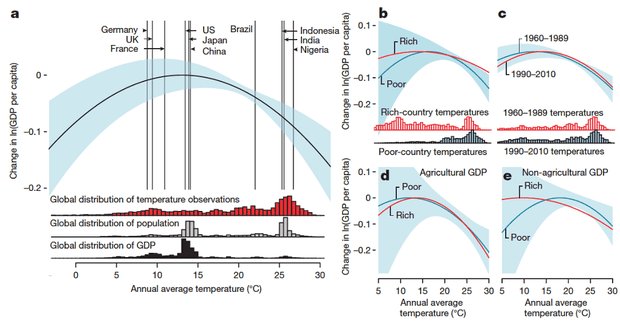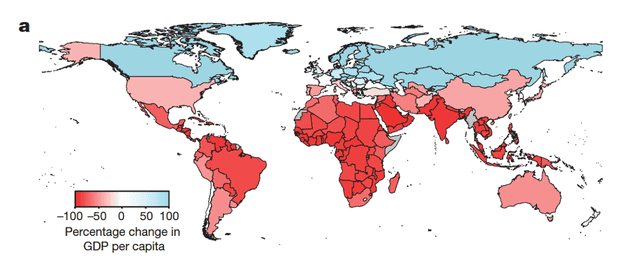Global warming could be more devastating for the economy than we thought
Posted on 27 October 2015 by dana1981
A new study published in Nature by scientists at Stanford and UC Berkeley has made waves for its finding that thus far we have dramatically underestimated the damage human-caused climate change will do to the global economy.
By looking at data from 160 countries across the 50-year period from 1960 to 2010, the authors found that an average local temperature of 13°C (55°F) is economically optimal, particularly for agricultural productivity. That temperature roughly reflects the current climate in many wealthy countries like the USA, Japan, France, and China.
If regional temperatures are cooler, then warming benefits the local economy, but past that peak temperature, warming reduces economic productivity. The robustness of this result is particularly interesting. The study found that it held true for both rich and poor countries, and that the relationship held for both the 1960–1989 and 1990–2010 time frames.

Global relationship between annual average temperature and change in log gross domestic product (GDP) per capita during 1960–2010 with 90% confidence interval, broken down by poor and rich countries, agricultural and non-agricultural GDP, and time frames (1960–1989 and 1990–2010). Source: Burke et al. (2015), Nature.
Economies haven’t adapted to hotter temperatures
To date, economists had believed that global warming would not impact economic growth in wealthy countries, because it was assumed they would have the resources to adapt to a changing climate. However, looking at data over the past half century, the authors found that wealthy countries have been nearly as vulnerable to temperatures warming beyond 13°C as poorer countries.
We find only weak suggestive evidence that richer populations are less vulnerable to warming, and no evidence that experience with high temperatures or technological advances since 1960 have altered the global response to temperature. This suggests that adaptation to climatic change may be more difficult than previously believed, and that the accumulation of wealth, technology and experience might not substantially mitigate global economic losses during this century.
The study finds that if we continue on a business-as-usual path of high fossil fuel consumption and carbon pollution, 77% of countries will be poorer in 2100 than they would be in a world in which we curb global warming. Some countries (5–43% of the world’s nations) might even be poorer in 2100 than they are today as a result.
The news isn’t all bad. Some colder countries like Canada and Russia will see economic benefits from global warming. However, most of their trade partners will be experiencing slowed economic growth at the same time.
Moreover, the countries with hot climates whose economic productivity will take a particularly hard hit from further global warming tend to already be poor, in regions like Africa, southeast Asia, and South America. This reinforces the unfortunate reality that poorer countries, which contribute the least to the problem, are the most vulnerable to the consequences of climate change.

Change in national GDP per capita in 2100 under business-as-usual warming (RCP8.5) relative to projection using constant 1980–2010 average temperatures. Source: Burke et al. (2015), Nature.
What it means: a higher social cost of carbon
A study published earlier this year by Stanford economists Frances Moore and Delavane Diaz concluded thatcontinued global warming will significantly slow economic growth in poorer countries. Their paper concluded that the ‘social cost of carbon’ – the dollar amount that carbon pollution costs us via climate damages – is between about $70 and $400, with a best estimate of over $200 per ton. This is a higher cost than IAMs currently yield, with best estimates generally at $100 per ton or less.
Professor Marshall Burke, lead author of this new study, says that his team is still working out how their results will impact estimates of the social cost of carbon. However, because their study finds that continued global warming will hurt economic growth in both poor and wealthy countries, Burke believes that it will yield an even higher social cost of carbon estimate than in the Moore & Diaz study.
As their paper notes, they are also likely underestimating the economic costs of climate change by focusing on temperature impacts, excluding other factors like sea level rise.
the slope of the damage function is large even for slight warming, generating expected costs of climate change 2.5–100 times larger than prior estimates for 2°C warming, and at least 2.5 times larger for higher temperatures. Notably, our estimates are based only on temperature effects (or effects for which historical temperature has been a proxy), and so do not include other potential sources of economic loss associated with climate change, such as tropical cyclones or sea-level rise
As Professor Burke told me,
[Economists] have significantly underestimated the potential for very negative climate impacts on the global economy. It is just really hard to see how the damage functions in the IAMs are consistent with historical experience.
An economic need for carbon pricing
Basic economics suggests that markets should include a price on carbon pollution that reflects our best estimates of the social cost of carbon. Carbon pollution creates costs that societies pay via climate damages and reduced economic productivity, but if the market doesn’t reflect those costs, consumers can’t make informed purchasing decisions. Economists call this an ‘externality’ and a ‘market failure,’ which Economics 101 says should be remedied by putting a price on carbon pollution.
Crucially, this is a point on which even contrarian economists agree. There is aconsensus among economists that there should be a price on carbon pollution. One economist who is an advisor to the anti-climate policy Global Warming Policy Foundation concluded in a recent working paper,
Help us do science! we’ve teamed up with researcher Paige Brown Jarreau to create a survey of Skeptical Science readers. By participating, you’ll be helping me improve SkS and contributing to SCIENCE on blog readership. You will also get FREE science art from Paige's Photography for participating, as well as a chance to win a t-shirt and other perks! It should only take 10-15 minutes to complete. You can find the survey here: http://bit.ly/mysciblogreaders. For completing the survey, readers will be entered into a drawing for a $50.00 Amazon gift card, as well as for other prizes (i.e. t-shirts).































 Arguments
Arguments






























This is huge. (moderator edited)
In terms of policy implications and instituting a carbon tax this is a really important contribution. Contrary to the oft-heard meme ("humans have always adapted", "when absolutely necessary, technology changes"), we are building up a debt which future generations will not have the wherewithal to service, since it is the capital itself (the bounty of nature) that is being destroyed and squandered.
Future losses incurred in comparison to current costs have always remained a vague discussion, even if absolutely clear in principle. This article closes the escape routes open to rhetorical rascals.
[RH] Please avoid all caps.
Important tip when presenting this study out in the blogosphere: The classic denier slam, 'its all based on computer models' (as if computer models instantly disqualify a study's conclusions) doesn't apply to this study.
ubrew12 @2
It is interesting that computer models are routinely attacked in the climate change debate, whereas when it comes to predicting economic trends to determine economic policy and microtrading shares on the stock market, computer modelling isn't questioned.
As for carbon taxes and the potential impacts associated with climate change on an economy, I would have thought that some carbon-based surcharge could be introduced that operated like the premium paid to an insurance company to insure against risk. It would be interesting to see how the actuaries working for insurance companies are modifying their tables to take into account the increased risks associated with climate change.